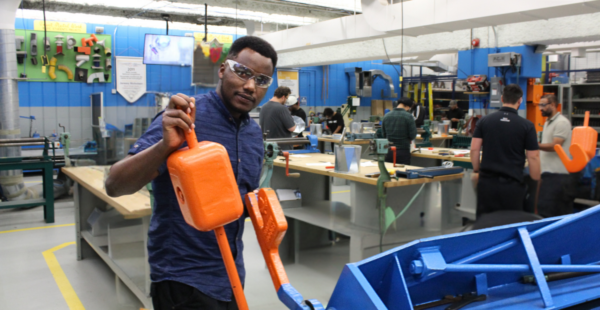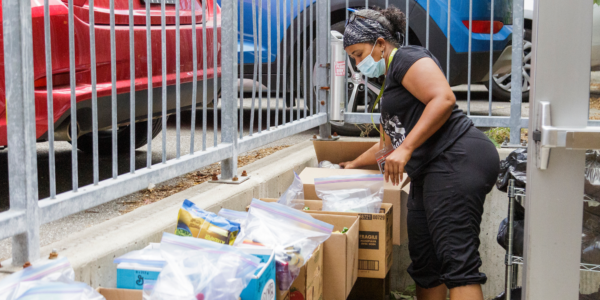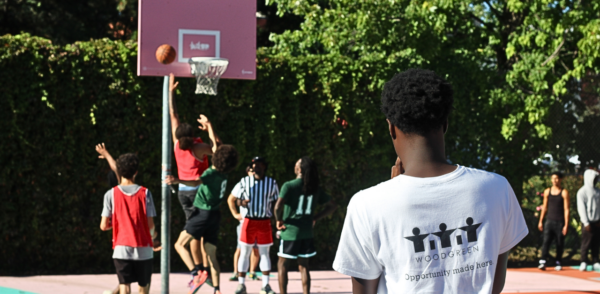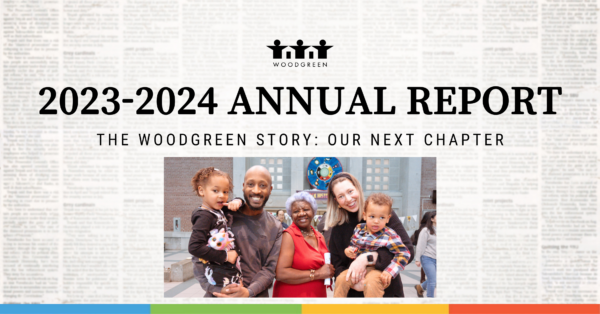Mohammad Shaikh’s view of Toronto – and life – both look very different than they did just a few months ago. “I don’t feel helpless anymore,” says Shaikh, 70, a former professor of international banking at the University of British Columbia Okanagan. “Now it’s just nice to know that somebody cares for me.”
But Shaikh’s tone changes when he recalls where he was in late 2021. “My biggest fear was that I would die in my apartment alone and no one would notice.” He will tell you, with disarming honesty, how it was he found himself alone and in crisis in East Toronto. And how it was that one member of WoodGreen’s staff was determined to turn Shaikh’s life around.
Unable to move
After decades of teaching at UBC, Shaikh returned to Toronto to care for his dying mother. He worked at a national bank, retiring five years ago with income from CPP (Canada Pension Plan), OAS (Old Age Security) and a small company pension. Despite a background in finance, Shaikh says a series of bad investments put him “in a very bad situation”, which deteriorated his relationship with his wife and ultimately ended his marriage. “I was continually convinced I could create more wealth,” says Shaikh, who has two adult daughters with whom he has no contact.
Attempting to re-enter the job market in his late sixties was difficult, he says, but was made virtually impossible once the pandemic took hold. That is how Shaikh found himself in 2021, living in a small apartment above a restaurant and up a steep flight of stairs. Until one day he fell down those stairs badly injuring the vertebrae in his back. The pain grew worse until Shaikh says he could no longer get out of bed, even to make it to the bathroom. He had no one looking in on him and no one to call for help. Convinced he would die if he didn’t get assistance soon, Shaikh did the only thing he could think of. “It was then that I decided to call an ambulance.”
Facing eviction
Shaikh spent three weeks in hospital but when he returned to his apartment he fell in the bathtub and re-injured his back. He says he asked his landlord to install grab bars in the bathtub but was instead served with an eviction notice.
“I was desperate,” he said. “All the money I had was gone.”
An occupational therapist sent to check on him helped him call the Toronto Seniors’ Helpline (416-217-2077), which quickly connected him with WoodGreen’s Crisis Outreach Service for Seniors (COSS).

"Christmas Angel"
It was then that Shaikh met a woman he calls his “Christmas Angel”, Lara DiLeonardo, a team lead at WoodGreen.
“Lara came to my apartment and she saw the squalor I was living in,” says Shaikh. “She made it her mission to help me.”
Since starting at WoodGreen mid-pandemic, DiLeonardo says she has learned a lot about the resilience of people, as well as about how society views seniors in our communities. She says often people assume that seniors have a network of friends or family around to take care of them. But that’s often not the case.
“A lot of people in their lives that were supports have either passed away or are ill...but for some people, they either don’t have that family or, for whatever reason, those relationships have become strained or non-existent,” says DiLeonardo.
Seniors' mental health suffering
The teams at Crisis Outreach Services for Seniors helped more than 2,745 clients last year, and DiLeonardo says the pandemic has been particularly hard on seniors’ mental health. While the general public turned to virtual forms of socialization such as video chatting, texting and messaging, she says not all seniors were willing or able to embrace that societal shift.
“Some people are fearful about technology,” says DiLeonardo, “for others, their capabilities have changed, so learning a new technology or skill is quite difficult.” There are also financial barriers for seniors living on fixed incomes who may not be able to afford devices or high-speed internet.
WoodGreen's personal touch
It’s why WoodGreen’s Crisis Outreach Service for Seniors staff have continued seeing clients in-person throughout the pandemic, making more than 36,000 crisis services home visits last year alone.
Rochelle McAlister, Senior Manager of Seniors Mental Health & Addictions at WoodGreen, says the team has seen an increase in incidences of elder abuse, strained family dynamics, social isolation, hoarding and the impact of the housing crisis resulting in many seniors facing eviction for the first time in their lives. She acknowledges that the increase may be simply because WoodGreen and its partner agencies have the unique opportunity to see what seniors’ homes and lives look like behind closed doors, underscoring the importance of in-person visits.
Growing need for services
With an aging population, both DiLeonardo and McAlister say they expect the need for crisis services for seniors will only grow. “We’ve talked a lot about social isolation during the pandemic,” says DiLeonardo, “but once the pandemic is over, these problems with these seniors will continue.”
Seniors can refer themselves, as Shaikh did, by calling the Toronto Seniors Helpline (416-217-2077), but most of WoodGreen’s calls come from someone who is worried about a senior, such as a family member, neighbour, landlord or doctor. The senior doesn’t need to consent for the first visit, but would have to agree to keep working with the crisis services team which includes a team of social workers, a nurse practitioner and a geriatric psychiatrist.
'She restored my dignity'
It’s this broad support approach that Mohammad Shaikh says has completely changed his life, and he credits DiLeonardo for caring enough to truly see both the situation and the person on that first home visit.
“She said to me, ‘Mohammad, you don’t have to lose your dignity, and she restored my dignity,” he says.
WoodGreen also helped ensure Shaikh was collecting all the benefits to which he was entitled, assessed his income and advised him of his legal rights with regard to eviction. DiLeonardo helped arrange for him to move into an apartment in WoodGreen’s Gerrard Street East housing facility.
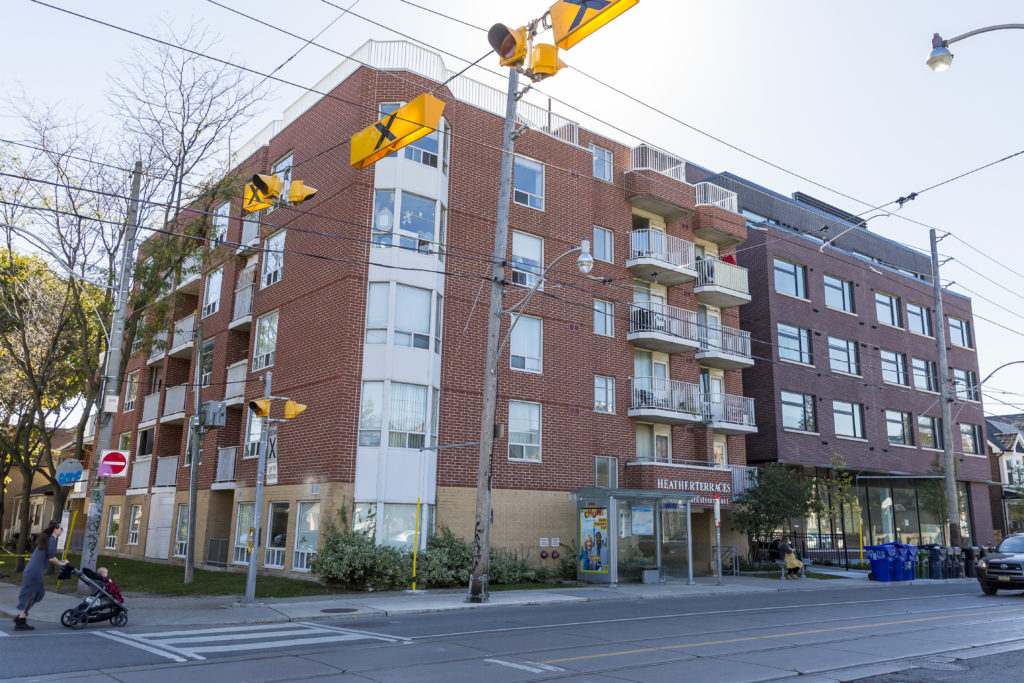
The site has 36 one-bedroom independent living units in a mix of rent-geared-to-income and market rent units for seniors 59+. Residents have access to a part-time housing worker for support. Shaikh says he’s relieved he is no longer facing a steep flight of stairs because the building has an elevator. He also gets meals four days per week.
Creating a Community of Support
The building is across the street from a library and a community centre with a pool. Shaikh says DiLeonardo encouraged him to join some community groups and build his own social network. She helped him find a group that meets weekly and is composed primarily of expats from India and Pakistan, like Shaikh, who immigrated to Canada 50 years ago.
He now has friends and connections, people who check in on him and care what happens to him. Shaikh says that while he is alone, he is not lonely and that the friends he’s made are helping one another psychologically to overcome feelings of isolation. It’s a life that Shaikh didn’t imagine was possible just a few short months ago.

“My case is a clear example of the need for services like WoodGreen,” says Shaikh. He credits DiLeonardo with saving his life.
“Lara didn’t just listen to me and hear my story, she suggested ways to make my life better,” he says. “What she’s provided is beyond the call of duty.”
Yet DiLeonardo herself wishes everyone saw caring for seniors like Shaikh as part of their duty to society.
“If you have a neighbour that you know that’s elderly, just check in on them. See if they have what they need. Let them know about programs that are out there. You don’t necessarily need to be the person who does the groceries for them but connect them with programs that can. And call your family members and check-in.”
Sometimes, however, DiLeonardo says it is as simple as taking the time to recognize the value seniors have brought, and continue to bring to their communities, and acknowledging that with a simple act of humanity.
“Just say hello. You just don’t know how lonely people are.”
As for Shaikh, sitting in his new apartment looking at the city and about to meet up with his friends, he says his experience with WoodGreen has changed his view of the world. “My outlook is much better and I truly believe people are very good,” he says, then adds with a chuckle, “now if only the weather will start to cooperate so I can get outside in the sunshine.”


